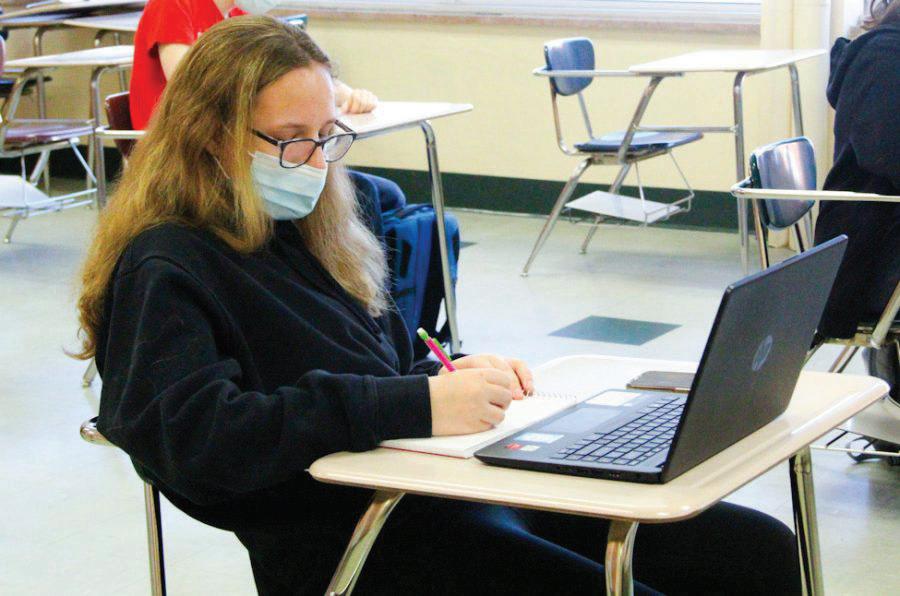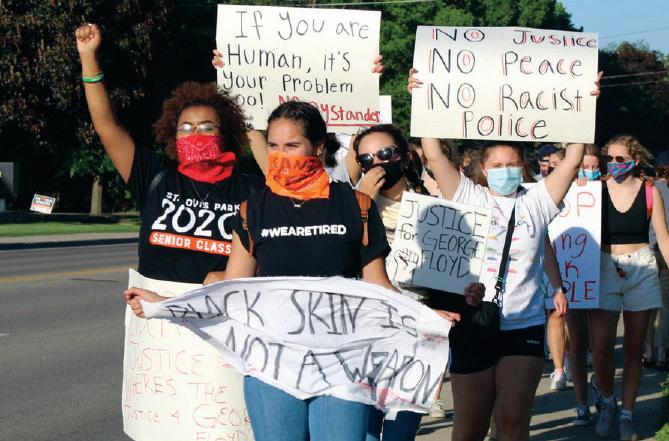
7 minute read
Schedule change to exclude asynchronous classes
from Issue 3, March 22
by SLP Echo
Seven-period-day to be reimplemented
Talia Lissauer & Maddie Schutte
Advertisement
talialissauerl@slpecho.com maddieschutte@slpecho.com
After spending most of the year with a mix of asynchronous and synchronous classes, freshman Niya Hollie said the switch to full in-person classes will demand too much energy from students.
“It’s a little aggravating going to all the classes because it requires a lot. You have to be focused, you have to do a lot and you have to move back and forth,” Hollie said.
Beginning April 12, Park will increase to no assigned capacity and transition to a seven-period all day schedule. All students will be required to attend all classes on Mondays, with Cohorts A and B in-person and Cohort C online. Wednesdays will remain a student-support day, especially focusing on students in Cohort C.
Students in Cohorts A and B should attend class in-person daily. Cohort C students will have assignments on Schoology to complete by Friday and should log on for at least a check-in, but potentially a full class period if requested by the teacher during other days, according to interim Principal Wendy Loberg.
“We want to go back to having kids understand school is all day,” Loberg said. “We’re going to support kids while they do work within the classrooms. While kids work at home and they can either get on the link or get off the link (to reduce) screen time.”
With the previous setup, students were able to log in from anywhere. Assistant principal Jessica Busse said this posed an issue when students became too flexible with where they logged in from.
“The problem we’re running into is that parents think their kids are coming to school and kids are doing class all over the place and think ‘I can do school at Caribou’ … and parents don’t know where their kids are and they think that they’re in one place,” Busse said.
Sophomore Anna Hodges said she found asynchronous classes beneficial when teachers gave students assignments. However, she feels there were asynchronous periods where students sat around and didn’t utilize their time well.
“I do (find asynchronous classes beneficial) for some classes because sometimes teachers will still give work and make it so they’re still engaging,” Hodges said. “But then there’s some where it’s like they don’t really care and you do whatever you want, and kids take that for granted and instead of doing work they go on their phones.”
Loberg said it's important all follow the mitigation strategies, including social distancing at 3 feet apart if 6 feet is not possible, along with wearing masks, washing hands and staying home when feeling ill.
“Right now, we are cleared to have a Prom and Commencement, and I don’t want anything to happen to jeopardize both of those,” Loberg said. “We don’t know what they’ll look like yet, but we’ll do something, and they will be awesome.”
Photo: Emmy Pearson Writing: Freshman Evie Schmitz works on an assignment during her synchronous
Niya Hollie, freshman
No assigned capacity: what to expect Do I have to attend every class period?
In-person students will attend
every class. There will be no more asynchronous periods.
Cohort C students will attend every class period on
Mondays. Whether or not they have live class after Monday will depend on the class Students in Cohort A and B will return to school at no assigned capacity April 12, with students attending school everyday in-person expect Wednesday.
What will Cohort C do aside from Mondays? Is it safe to have Cohorts A and B in school at the same time? If I'm in Cohort A or B, can I do school from a different location?
Teachers should have a weekly folder on Schoology with assignments for Cohort C for
the week. Teachers may ask that Cohort C students attend class when needed after Mondays. They will at least check-in to all classes As of March 15, 33 percent of students are in Cohort C. A minimum of 3 feet of social distancing will be in place when 6 feet is not possible, which will be enough to keep the students safe No. If a Cohort A or B student is not in class in-person, they will
be marked as an unexcused
absence unless excused by a parent. It is no longer an option for Cohorts A and B to login online to make sure students stay in school
Derek Chauvin trial begins
Simultaneous feelings of doubt, hope emerge
Jacob Khabie
jacobkhabie@slpecho.com

Attempting to put her emotions aside in fear of being let down later on, senior Grace Kanyinku prepared herself for the trial of Derek Chauvin.
“Until I see the result of (the trial), I don’t really have any super hopeful or super cynical thoughts on it,” Kanyinku said.
Former Minneapolis police officer Derek Chauvin is being tried for the murder of St. Louis Park resident George Floyd, which set off Black Lives Matter protests across the country. Jury selection began March 8, and opening statements are scheduled for March 29.
High achievement coordinator Lee-Ann Stephens said while she would like for Chauvin to be convicted, she is doubtful that it will actually happen.
“Bottom line: I want Derek Chauvin to go to jail,” Stephens said. “But as a Black woman in America and understanding our history of racism and the value that is not placed on a Black man’s life, I’m not hopeful that it might happen.”
While he is hesitant about the outcome of the trial, junior Ezra Hudson said he believes public is in favor of convicting Chauvin.
“This is the first case where people are like ‘Oh, maybe the police officers are wrong’ or ‘Maybe we should take Black lives seriously,’” Hudson said.
According to Kanyinku, one aspect of the trial that is particularly traumatizing for her is the reposting of the video of George Floyd’s death, along with other videos of Black people experiencing severe violence, at the hands of the police.
“I understand knowledge is key, information is key, but seeing it all the time, it hurts,” Kanyinku said. “Everyone posting it all the time ends up doing a lot of harm, especially for the people that look like the people getting beaten in the video.”
Although the conviction of Chauvin wouldn’t solve the systemic issues at hand, Hudson said, it would still provide motivation for those fighting for racial justice.
“(If Chauvin is convicted) that’s not necessarily going to change the justice system, because it’s going to take a lot more than that, but is going to a positive boost of hope, per se,” Hudson said. “It’ll be like they finally got one right.”
Stephens, who is also the adviser of the Students Organized for Anti-Racism club, said she hopes the results of Chauvin’s trial create permanent change, as opposed to the performative changes she saw over the summer.
“For me, what’s so disappointing when it first happened there was this outrage,” Stephens said. “But I feel like that was all performative, it was for optics, because I haven’t heard a lot of those voices anymore.”
For Kanyinku, her work fighting for racial justice isn’t done, even if Chauvin does get convicted.
“Another thing we need to look at is — the justice system worked in this situation, great, but let’s look at why this happened,” Kanyinku said. “Let’s get to the root of the problem and work to fight that.” For students who would like to talk through the emotions that are bound to come up in the next couple of weeks, Stephens said it is a priority for her to be open. “I’m here to process, have conversations with them, to be silent, to grieve, just being available is super important for me,” Stephens said.
Hudson said the best way for administration to support students during Chauvin’s trial is to prioritize having conversations surrounding race and racism.
“There is not a single assignment that you could assign right now that is more relevant than what is going on right here in our city,” Hudson said.

Photo by Emily Ziessman Protests last May: Park alumni Victoria Caraballo and Selena Nejib lead a group of Park students and alumni at a memorial for George Floyd
Photo Activists: Protesters address racial injustice and police brutality at a family-friendly protest DESIGN BY Jacob Khabie






